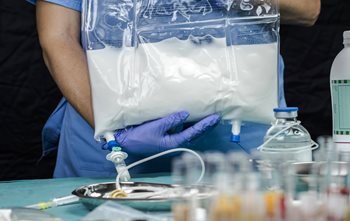
Total Parenteral Nutrition in the Adult Patient
This instructional course has been designed to provide current conceptual and operational knowledge to nurses and other healthcare providers interested in the provision of parenteral nutrition therapy. The understanding and use of TPN has evolved since its entry into mainstream healthcare several decades ago.
In early 2024, the Infusion Nurses Society (INS), recognized as the global authority in infusion therapy, released the updated Infusion Therapy Standards of Practice. The INS sets the accepted standards for infusion therapy practice for all healthcare settings. This course is based on the current best practices as defined by the Infusion Nursing Society and other governing agencies such as the CDC, and FDA.
State Boards of Nursing have varying positions on the role of the LPN/LVN in the administration of parenteral nutrition. Competency requirements are obtained and maintained through the healthcare provider's employer, facility or institution, with a preceptor. Pedagogy has developed skills competency checklists for all infusion related procedures and these are available in the course, for print out and completion with a preceptor. To view each state's Board of Nursing you may reference the resources section of the website or click here.
Questions? Check out our FAQs page and How Online IV Certification Works!
Objectives
- Identify at least three medical conditions that indicate the use of TPN.
- Identify at least three components of TPN.
- Demonstrate understanding of TPN administration by recognizing the steps involved in TPN preparation and infusion.
- Recognize at least two potential complications of TPN.
- State at least four TPN monitoring measurements.
Curriculum
Chapter 1: Indications for Parenteral Nutrition
- Altered Absorption Capacity
- GI Disorders Requiring Complete Bowel Rest
- Intractable Vomiting or Diarrhea
- Hypermetabolic States
- Anorexia Nervosa
- Maintenance of Normal Body Weight and Protein Status
- Restoration of Normal Body Weight and Protein Status
- Maintenance or Restoration of Normal Micronutritional Status
- Protein
- Carbohydrate
- Lipid
- Vitamins
- Minerals
- Trace elements
- Anthropometrics
- Biochemical
- Clinical
- Dietary
- Dextrose
- Amino Acids
- Lipids
- Water
- Electrolytes
- Vitamins
- Trace Elements
- Other Additives
- Central Venous Access Devices
- Electronic Infusion Devices
- TPN and Lipids
- Preparing the TPN for Infusion
- Initiating the Infusion
- Metabolic Complications
- Vascular Access Device-Related Complications
- Vital Signs
- Glucose
- Weight
- Intake and Output
- Laboratory Values
- TPN Administration
- IV Catheter Care
- California Bill 241
- Implicit Bias in Healthcare
- What is Implicit Bias?
- Implications of Implicit Bias in Healthcare
- How to Reduce Implicit Bias
Price: $60.00
Contact Hours: 5

Course Author

Pamela Clark
Pamela Clark, CRNI, is an infusion nurse with the Houston Methodist Sugar Land Hospital. She has more than 35 years of experience in infusion therapy and infusion education with both licensed nurses and patients. Her experience spans multiple infusion settings including: acute care, long-term care, home infusion, and ambulatory infusion care. She also has experience in oncology and oncology research.
Read Full BioCourse Accreditation
Additional Accreditations:
Course approved by the Florida Council of Dietetics and Nutrition, CE Broker Tracking #20-315844, course provides 5.0 contact hours. CE Broker Provider #: 50-13256.